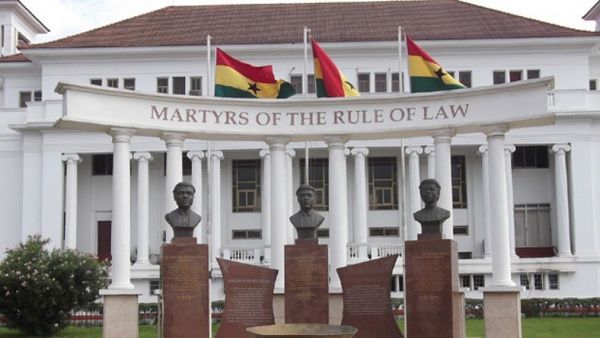Next to the health and economic sectors, the legal and justice sectors of countries have been prominent in the unfolding of the Covid-19 pandemic.
The justice sector moderates all other sectors of national life and is as active in peacetime as in times of war or emergency. But I would argue that in Ghana, the justice sector is not ready for this crucial role.
The sector has certainly been presented with work to do in response to this pandemic. A great deal of what it has been asked to do highlights inefficiencies in the system – and in many instances is forcing changes that should have been introduced long before Covid-19 struck.
Recent attempts to adjust the justice system to Covid-19 reveal that many justice sector interactions are completely unnecessary. Some of these are reflected in the arguments I have previously set out about reforms the system needs.
Covid-19 changes
The Ghanaian government has introduced a raft of interventions across the legal and justice system.
For example, it has clarified the constitutional and legislative basis for the containment and preventive measures that were put in place. The clauses of the Constitution dealing with emergency powers and limitation of rights were at play. So were the Public Health Act, the Immigration Act and many other laws.
But it’s gone further by introducing a new law that elaborates on the limitation of rights within the constitution. The Imposition of Restrictions Act was duly passed by parliament.
Using this law, the president has issued several executive instruments detailing measures for containing the virus.
But the new law, as well as the use of old statutes, has sparked controversy. Legal academics have written articles and made public statements on the legality and propriety of measures being taken to contain the pandemic.
The government has mobilised the state’s police and national security agencies. These are being used to stop gatherings and meetings and to arrest offenders. They are also being used to help health officials trace, track, and quarantine people who may have been in contact with others testing positive for the virus.
Public interest and political lawyers have also brought suits in court to challenge various aspects of the new law, as well as the legal implications of the partial lockdown. For example, Ghanaians were still expected to get their national identification cards in preparation for voter registration.
The country is due to go to the polls in December. Legal challenges have been mounted to stop the ongoing registration processes on the grounds that they violate the new restrictions on public gatherings and meetings.
Elsewhere in the justice sector, many prisoners have been processed for release, ostensibly to avoid overcrowding and its health risks if the virus finds its way to the prisons.
Useful lessons
Some of the responses to the pandemic show that aspects of Ghana’s justice system are actually unnecessary. Changes have been imposed that should in fact be the norm.
For example, early in the outbreak, the Chief Justice directed the Bench to practise strict case management techniques in a bid to prevent the spread of the virus.
This was long overdue and should have been the case even in ordinary times. The new directive simply underscores that it’s not necessary for people always to have to appear in person for cases. And the number of cases to be heard can be drastically reduced by using alternative dispute resolution mechanisms such as out of court settlements.
Other changes that should have been triggered is that material relevant to a case should be provided to the court before the case begins. Another is a call for greater use of technology in court processes to speed them up and decongest the courts.
It is disheartening that it has to take Covid-19 to initiate reforms in a legal system that serves little good to ordinary Ghanaians.
A significant feature of the new coronavirus disease is that it is a leveller. It affects the rich as well as the poor.
I must complete this piece by praying fervently for a justice sector leveller; a natural or other kind of event that will affect users of the justice sector in the same way; something that will equally affect the poor and the rich and influential in Ghana, so that for the first time, the dire need for more and faster reforms in our justice sector will be taken seriously.
Dean, University of Ghana School of Law, University of Ghana
Latest Stories
-
Shamima Muslim urges youth to lead Ghana’s renewal at 18Plus4NDC anniversary
2 minutes -
Akufo-Addo condemns post-election violence, blames NDC
10 minutes -
DAMC, Free Food Company, to distribute 10,000 packs of food to street kids
1 hour -
Kwame Boafo Akuffo: Court ruling on re-collation flawed
2 hours -
Samuel Yaw Adusei: The strategist behind NDC’s electoral security in Ashanti region
2 hours -
I’m confident posterity will judge my performance well – Akufo-Addo
2 hours -
Syria’s minorities seek security as country charts new future
3 hours -
Prof. Nana Aba Appiah Amfo re-appointed as Vice-Chancellor of the University of Ghana
3 hours -
German police probe market attack security and warnings
3 hours -
Grief and anger in Magdeburg after Christmas market attack
3 hours -
Baltasar Coin becomes first Ghanaian meme coin to hit DEX Screener at $100K market cap
4 hours -
EC blames re-collation of disputed results on widespread lawlessness by party supporters
4 hours -
Top 20 Ghanaian songs released in 2024
4 hours -
Beating Messi’s Inter Miami to MLS Cup feels amazing – Joseph Paintsil
4 hours -
NDC administration will reverse all ‘last-minute’ gov’t employee promotions – Asiedu Nketiah
5 hours

